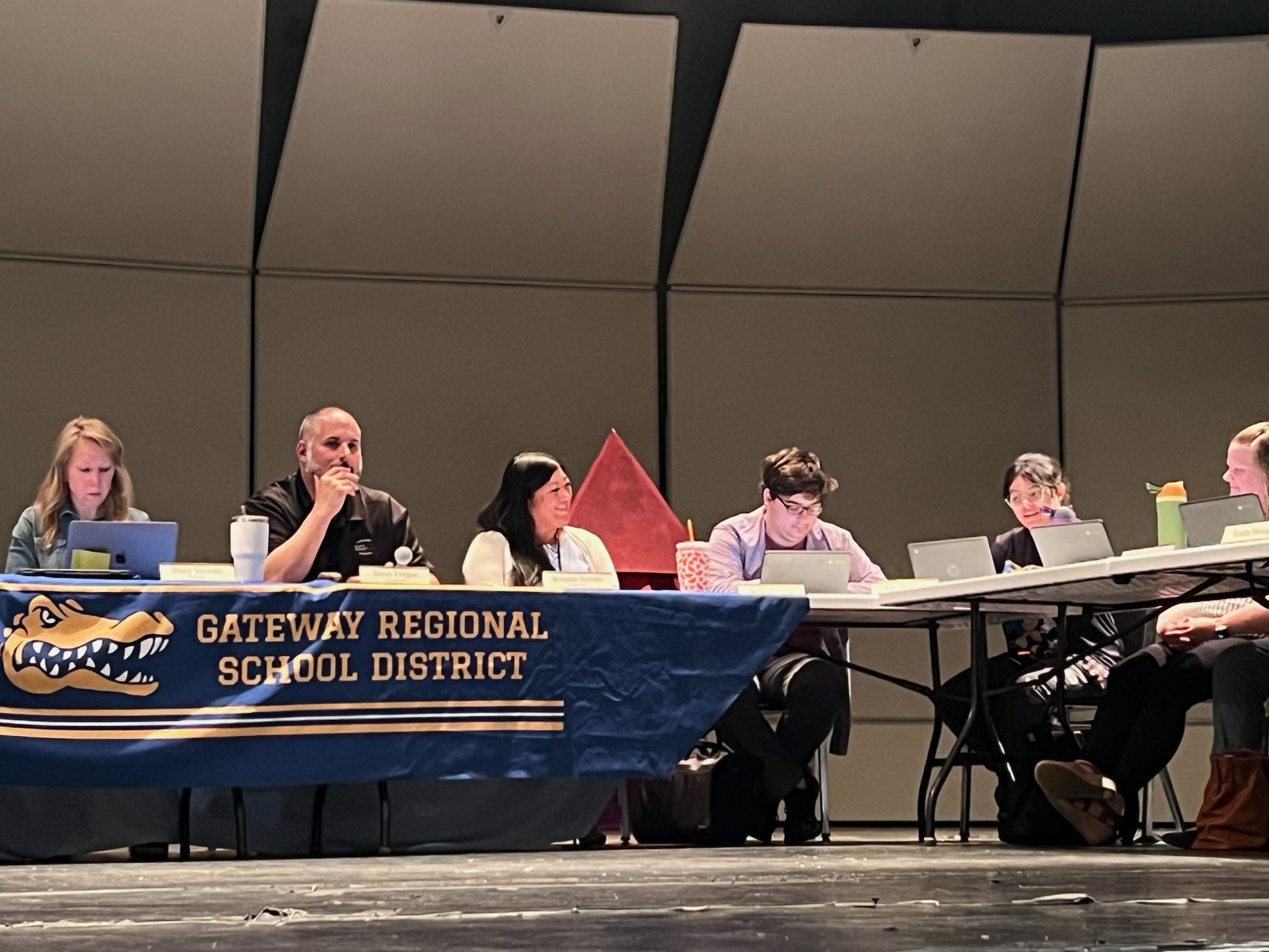Members of the Gateway Regional School Committee at the May 14 meeting on the Performing Arts Center stage.
Reminder Publishing photo by Amy Porter
HUNTINGTON — At the start of the May 14 Gateway Regional School Committee and in a conversation after the meeting, Superintendent Kristen Smidy talked about some of the administrative changes facing the district this year.
“I feel like we’re in a year of transition, with key retirements on staff,” Smidy said.
Assistant Superintendent Stephanie Fisk, who Smidy said has always led with integrity and done what is right for the district, will be retiring at the end of the year after more than three decades as the business manager. Amy Mason, lead teacher of the Visually Impaired program at the school, will be taking her place.
“We’re really lucky that she [Mason] was interested in the position. She is highly competent and committed to the district, and has been in apprenticeship with Fisk for a year learning the ropes,” she said.
Smidy said being a teacher, Mason will also bring the classroom lens to the position. “I’m so thrilled that Amy will be in this role. She has integrity and is genuine – all of the right things you need for that position.”
Also retiring is Deborah Kuhn, after 28 years as the Gateway district treasurer.
On the agenda at the School Committee meeting were changes in the new state graduation requirements. Smidy said with the removal of the MCAS graduation requirement, the district has discussed new requirements at Gateway that also meet state requirements.
Among the changes suggested, William Sullivan, Gateway Regional High School and Middle School principal said that Gateway has physical education and fine arts hours that are greater than is required by the state. He recommended reducing those hours to meet the state requirements, in order to allow students interested in other subjects more opportunities to pursue them.
Asked why fine arts should be cut, Sullivan said the intention is not to cut down those opportunities that would still be available for students to take.
Sullivan said Gateway is in alignment with the state in other subjects. However, he said the state currently has no foreign language requirement, and he has recommended two years of foreign language at Gateway to be in alignment with Mass Core standards for state colleges.
Brian Forgue questioned why the requirement of three years of lab science in 2028 and beyond would only be for students who want to attend a four-year college.
Sullivan said the requirement is tied to Mass Core standards. He said students in Gateway’s Chapter 74 programs of early education and care and welding would be pursuing other requirements, for example.
In response to another question, Sullivan said the administrative team is committed to providing personalized education to Gateway students, which he said is one of the advantages of a smaller school. He also said the changes in graduation requirements will take a couple of years to implement.
Brian Forgue spoke about the budget process in the State House and Senate. He said in its budget, the House cut Rural School Aid from the FY25 level of $16 million to $7.5 million, but the Senate restored it to $16 million. He said he expects that the funding is at risk of being cut in the conference meeting between the two legislative bodies.
“This is deeply disappointing,” Forgue said, adding that state representatives made it clear that Rural School Aid is an easy cut.
Forgue said Secretary of Education Patrick Tutwiler is coming to Northampton on May 27 for a meeting which several Gateway representatives and students plan to attend. He urged everyone to continue to contact their state representatives.
After the meeting, Smidy said that as a Tier I school for Rural School Aid, Gateway received almost one million dollars last year, among the highest funding in the state. She said the FY26 budget was based on level-funding of Rural School Aid but added that too much is up in the air to know what will happen.
Gateway is also ending its first year in a two-year cycle with BARR Foundation funds, after an initial year of “exploration and being inspired. We are now trying to implement some of the ideas that we saw in other districts or came up with looking at our data,” Smidy said.
“All of the schools did a really nice job with field trips, guest speakers and on-site activities, buzzing around all year paid for by the BARR Foundation.” She said they can continue to apply for two-year cycles in the future.
“BARR has been a real game-changer for us,” Smidy said. “It gives us funds to be creative and invest in our students and staff.” She gave the example of $50,000 that was spent on high quality professional development for teachers, “something that never could have been done without the BARR Foundation.”
Smidy also said there is a difference between BARR Foundation and Department of Education professional development. “The BARR Foundation says ‘we trust you to look at the data and your community, and find the best way to move forward,’ “ she said, whereas the state has a more narrow lens.
“We really focused on how to facilitate good teaching and learning, and how to ensure that students succeed after a productive struggle. We also focused on real-world experiences, and applying what they’re learning in the classroom to things they’ll encounter in life.” She gave the examples of composting initiatives in the elementary schools, and high school students visiting colleges and career opportunities.
Smidy said there were also many opportunities for students to engage in learning in a different way, such as student interns at the high school who were assigned to the elementary schools to support school-wide initiatives. One high school intern assigned to Chester is helping them conduct a schoolwide Willy Wonka Day in advance of their school play on June 12 at 6 p.m. in the Gateway Performing Arts Center.
“I feel like we made some real progress with learning in the classroom because of PD, and learning outside of the classroom with money from BARR to bring experiences to students and to bring students to new experiences,” Smidy said.
During public participation at the start of the meeting, several residents, including Chester School Committee representative Jeana Briggs spoke about the ongoing personnel issue at Chester Elementary School, where principal Vanna Maffuccio has been on paid administrative leave since January, and no resolution has been reached.
Briggs had requested the School Committee include a discussion of parental and student notification in emergency circumstances on the agenda, which was subsequently referred to the policy subcommittee.



